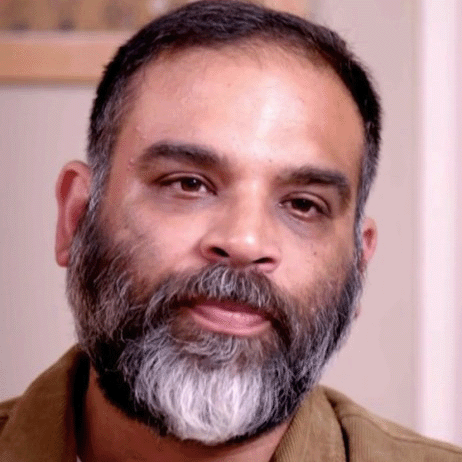
B.A., English, St. Xavier’s College, University of Bombay, 1994
M.A., English and Aesthetics, University of Bombay, 1997
Ph.D., Graduate Institute of the Liberal Arts, Emory University, 2006
Rohit Chopra's research centers on global media and cultural identity, new media, and media and memory, with a focus on global Hindu nationalist and far-right online communities. More recent interests include the history of ideas in cultural texts, disability and media, food and media, and global music.
Rohit is the the author of The Gita for a Global World: Ethical Action in an Age of Flux (Westland, 2021, revised edition 2023), The Virtual Hindu Nation: Saffron Nationalism and New Media (HarperCollins, 2019; revised and updated edition in progress), and Technology and Nationalism in India: Cultural Negotiations from Colonialism to Cyberspace (Cambria, 2008) and co-editor of Global Media, Culture, and Identity: Theory, Cases, and Approaches (Routledge, 2011). He is the editor of a forthcoming special section/issue of Comparative Studies of South Asia, Africa and the Middle East on the theme of "Religion and its Publics in South Asia" and has edited a special issue of the Economic and Political Weekly (2011) on the topic of the resurgence of empire. Rohit has published in a number of journals, including Emory International, Law Review, Socialist Studies, New Media and Society, International Journal of Communication, Global Media and Communication, First Monday, and Cultural Studies, in addition to authoring numerous book chapters. He is currently working on two book projects: an academic monograph on the memory of the Babri Masjid demolition in 1992, the 1992-93 riots that followed, and the 1993 bomb blasts in Bombay, and a trade book on disability in global culture and media.
For 2024-25, Rohit will be a Visiting Scholar at the Center for South Asia at Stanford University, a position he also held during the 2014-15 academic year.
Rohit currently serves on the advisory board of The Center for the Study of Organized Hate, an organization dedicated to research and advocacy related to hate networks in mediated and non-mediated spaces. He has also served as an expert or consultant for global government, non-profit, policy, and corporate organizations in relation to the impact of legacy media, new media, and social media on diversity, human rights, and politics. He is a member of the South Asia Scholarly Activist Collective, an initiative committed to inclusive politics, academic freedom, and critically engaged scholarship in the humanities.
Rohit writes on media, politics, society, and culture for a number of global media organizations. His work has been published in The Conversation, BBC, South China Morning Post, Outlook India, Scroll India, Wire India, LiveMint, Print India, Quartz, Caravan India, and New Inquiry and he has appeared on or been cited as an expert in Al Jazeera, the Atlantic, Wired, Vice, The Guardian, Voice of America, Religion News Network, Buzzfeed, and Business Insider, among other media outlets. He co-founded and co-hosted the India Explained podcast, which ran from 2018 to 2023, covering matters of politics, art, culture, media, and technology of relevance to global Indian communities.
-
Food and Communication (COMM 188)
-
Identity, Privacy, and Politics in the Digital Age (COMM 185)
-
Global Media and Postcolonial Identity (COMM 184)
-
Disability in Global Popular Culture (COMM 181D)
-
Global Music: Profits, Poetry, and Politics (COMM 181M)
-
Violence and Communication (COMM 180)
-
AI and the Human in Science Fiction Cinema (COMM 141)
-
Qualitative Research Methods (COMM 101)
-
Global Media Technologies, Culture, and Politics (COMM 80)
-
Approaches to Communication Research (COMM 4)